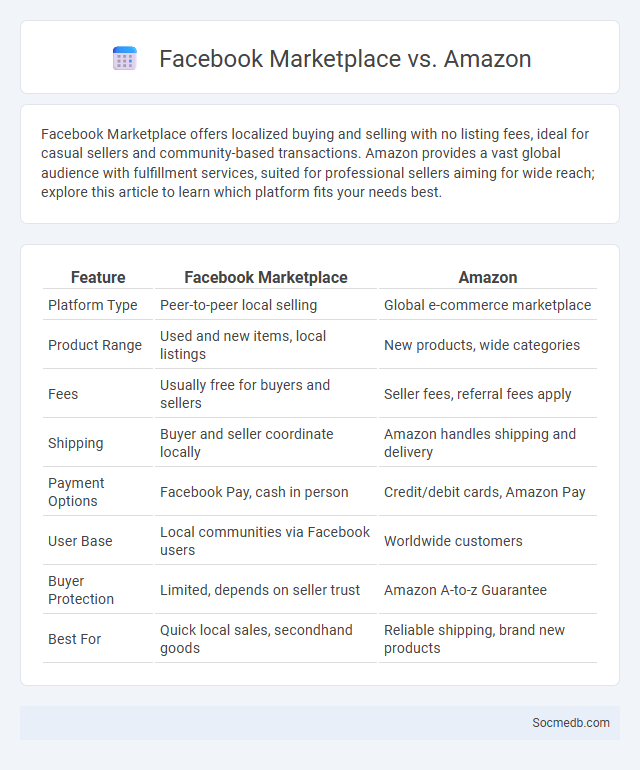
Photo illustration: Facebook Marketplace vs Amazon
Facebook Marketplace offers localized buying and selling with no listing fees, ideal for casual sellers and community-based transactions. Amazon provides a vast global audience with fulfillment services, suited for professional sellers aiming for wide reach; explore this article to learn which platform fits your needs best.
Table of Comparison
| Feature | Facebook Marketplace | Amazon |
|---|---|---|
| Platform Type | Peer-to-peer local selling | Global e-commerce marketplace |
| Product Range | Used and new items, local listings | New products, wide categories |
| Fees | Usually free for buyers and sellers | Seller fees, referral fees apply |
| Shipping | Buyer and seller coordinate locally | Amazon handles shipping and delivery |
| Payment Options | Facebook Pay, cash in person | Credit/debit cards, Amazon Pay |
| User Base | Local communities via Facebook users | Worldwide customers |
| Buyer Protection | Limited, depends on seller trust | Amazon A-to-z Guarantee |
| Best For | Quick local sales, secondhand goods | Reliable shipping, brand new products |
Introduction to Online Marketplaces
Online marketplaces are digital platforms that connect buyers and sellers, facilitating the exchange of goods and services across diverse categories. Social media integration within these marketplaces amplifies user engagement by enabling seamless sharing, reviews, and targeted advertising based on user behavior and preferences. Leading platforms like Facebook Marketplace, Instagram Shopping, and TikTok Shop illustrate the convergence of social networking and e-commerce, driving substantial growth in online retail sales globally.
Overview of Facebook Marketplace
Facebook Marketplace enables users to buy and sell items locally through an intuitive platform integrated within the Facebook app and website. Featuring millions of listings across categories like electronics, furniture, and vehicles, Marketplace provides robust search filters and direct messaging for seamless transactions. To maximize your selling potential, optimize your listings with clear photos, detailed descriptions, and competitive pricing.
Exploring Amazon Marketplace
Exploring Amazon Marketplace allows you to tap into one of the largest e-commerce platforms with millions of active users. By leveraging social media channels, you can drive targeted traffic to your Amazon listings, increase brand visibility, and boost sales through strategic content and advertising campaigns. Optimizing your product descriptions and engaging with customer reviews enhances your presence across both Amazon and social media ecosystems.
Comparing User Interfaces
Social media platforms like Facebook, Instagram, and Twitter offer distinct user interfaces designed to enhance user engagement and experience. Facebook features a complex interface with customizable menus and extensive content sharing options, while Instagram prioritizes visual content through a minimalist, image-centric layout. Twitter emphasizes concise communication with a straightforward timeline and real-time updates, optimizing for quick interactions and news consumption.
Product Listing and Coverage
Product listing on social media platforms enhances visibility by showcasing detailed descriptions, high-quality images, and pricing, directly influencing purchase decisions. Comprehensive coverage across multiple social media channels ensures consistent brand messaging and maximizes audience reach, leveraging targeted advertising and algorithm-driven content delivery. Optimizing product listings with relevant keywords and rich media improves searchability and engagement, driving higher conversion rates.
Seller and Buyer Experience
Social media platforms enhance seller experience by providing advanced targeting tools that increase product visibility and streamline customer engagement, leading to higher conversion rates. Buyers benefit from personalized recommendations, real-time reviews, and interactive content that facilitate informed purchasing decisions and improve satisfaction. Both parties experience seamless communication through integrated messaging and payment options, creating a cohesive and efficient transaction process.
Fees and Commission Structures
Social media platforms generate revenue primarily through diverse fees and commission structures, including advertising costs, subscription charges, and in-app purchases. Your budget should account for variable commission rates imposed on sales or transactions facilitated within the platform, often ranging from 10% to 30%. Understanding these fee frameworks helps optimize spending and maximizes return on investment when leveraging social media for business growth.
Shipping, Delivery, and Fulfillment
Efficient shipping, delivery, and fulfillment processes are crucial for social media-driven e-commerce success, enhancing customer satisfaction and retention. Real-time tracking and automated notifications streamline order management, reducing delays and increasing transparency. Integrating social media platforms with logistics solutions ensures seamless inventory updates and faster fulfillment cycles.
Trust, Security, and Customer Support
Social media platforms prioritize trust and security by implementing advanced encryption, rigorous authentication methods, and proactive content moderation to protect your personal data from cyber threats. Effective customer support teams are available 24/7 to address account issues, privacy concerns, and technical difficulties promptly, enhancing user confidence and satisfaction. Maintaining these standards ensures a safer and more reliable social networking experience for you and the entire online community.
Final Verdict: Choosing the Right Marketplace
Selecting the right social media marketplace depends on target audience demographics, platform engagement rates, and advertising tools. Facebook and Instagram offer extensive user bases with advanced targeting options, while TikTok excels in reaching younger, trend-driven consumers. Evaluate campaign goals and budget constraints to maximize return on investment across social media marketplaces.
 socmedb.com
socmedb.com